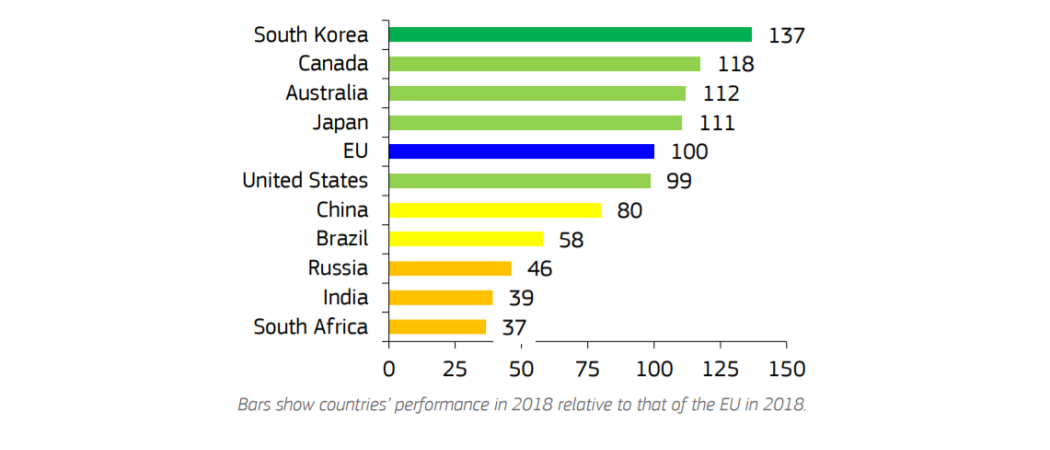The European Commission’s 18th annual innovation scoreboard shows the EU has overtaken the US for the first time, while across Europe, the UK and Luxembourg lose their innovation leader status and Estonia joins the ranks of strong innovators

The European Commission’s 2019 Innovation Scoreboard shows the EU has for the first time moved ahead of the US in innovation performance, while the UK is dropped from the ranks of innovation leaders, despite a 17 per cent increase in performance since 2011.
The EU's lead over Brazil, India, Russia, and South Africa remains considerable, but it is losing ground to Japan and South Korea, while China is catching up fast, improving at a pace three times faster than the EU's innovation performance growth.
Within the EU, Luxembourg joined the UK in dropping from the top-ranking innovation leader status to the strong innovators group, while Estonia joins the ranks of strong innovators for the first time.
Sweden is the EU’s innovation leader this year, followed by Finland, Denmark and the Netherlands. Performance improved by 15 per cent or more in seven countries: Lithuania, Greece, Latvia, Malta, UK, Estonia, and the Netherlands.
The innovation ranking has been previously criticised by innovation experts, who claim the commission’s interpretation of innovation performance is not useful for policy-makers and politicians. The score increases if a country puts more resources into innovation, even if there are no outputs resulting from additional investment.
The EU measures innovation performance through an average score of 27 indicators and puts EU countries into four performance groups: innovation leaders, strong innovators, moderate innovators and modest innovators.
Representatives of the UK’s innovation agency Innovate UK say this year’s results should be taken with a grain of salt, as 2018 and 2019 results cannot be directly compared, mainly because the new report is using an updated methodology and it sources country data differently from last year.
The commission says while its methodology was significantly modified in 2017, it has not made changes to the main measurement framework. But it admits, “Due to data revisions for some indicators, the results for earlier years in this report are not directly comparable to those reported in previous editions.”
Other innovation indexes, such as the Global Innovation Index, compiled by the French business school INSEAD and the World Intellectual Property Organization (WIPO), add to the confusion. For example, in 2017, the UK jumped from eighth to fifth place in the EU scoreboard and secured a spot among the continent’s innovation leaders. That same year, the UK was downgraded from third place to fifth in in the WIPO table.
This raises the question whether innovation performance is actually going up or down in the UK. In a 2017 blog post, Dan Hodges, head of economics, analysis, and market insight at Innovate UK said, “neither of these indexes really answers that question.”
The next WIPO global innovation index, due to be released at the end of July, will measure the innovation performance of 129 countries based on 80 indicators, including political environment, education, infrastructure and business sophistication.
Considerable increases
On average, the innovation performance of the EU has increased by 8.8 per cent since 2011. From that year on, performance increased in 25 EU countries. The most considerable increases were in Lithuania, Greece, Latvia, Malta, UK, Estonia, and the Netherlands. Performance decreased the most in Romania and Slovenia.
The commission hopes its upcoming research and innovation programme Horizon Europe, due to start in 2021, will keep the EU at the forefront of global research and innovation.
However, research universities say the proposed budget of €94 billion will not be enough to achieve that. A group of European university associations is calling for a €160 billion budget, while some members of the European Parliament have said EU should spend at least €120 billion on Horizon Europe.
It is pleasing to see the EU making “general progress”, said Carlos Moedas, Commissioner for Research, Science and Innovation “Yet, to stay ahead in the global race, both the EU and our member states need to continue investing and developing the right policies for innovation to flourish.”
The commission has made country-specific recommendations recently, urging member states to invest more in research and innovation to economic growth and competitiveness.
Performance drop for modest innovators
The report shows a significant decline in performance in Romania and Slovenia compared to 2011 levels. Romania is once more the worst performer with a 10.7 per cent decline since 2011, mainly due to a drop in the number of new PhD graduates. In Slovenia, performance declined by 10.6 per cent, but it maintains its moderate innovator label.
Bulgaria and Romania are the only member states labelled as modest innovators. Compared to 2017, performance in Bulgaria increased by 2.4 per cent, but 2018 performance is still below 2011 levels. A strong decline in 2012 has only partially been addressed, the commission says. Both countries show innovation performance levels below 50 per cent of the EU average.
The 2019 innovation table league is accompanied by the Regional Innovation Scoreboard, a comparison across 238 regions of 23 EU member states. Cyprus, Estonia, Latvia, Luxembourg, and Malta are included at the country level.
The most innovative regions in the EU are Helsinki-Uusimaa, Finland followed by Stockholm, Sweden and Hovedstaden, Denmark. For 159 regions, performance has increased since 2011, showing that a boost in regional innovation reduces performance differences between regions. However, the report also shows strong declines in regions in Germany, France and Spain.
“Innovation hubs can also grow in countries with less strong economies, and these findings help us support innovation in regional ecosystems, including in less developed regions,” said EU commissioner for regional policy Corina Creţu.





 A unique international forum for public research organisations and companies to connect their external engagement with strategic interests around their R&D system.
A unique international forum for public research organisations and companies to connect their external engagement with strategic interests around their R&D system.